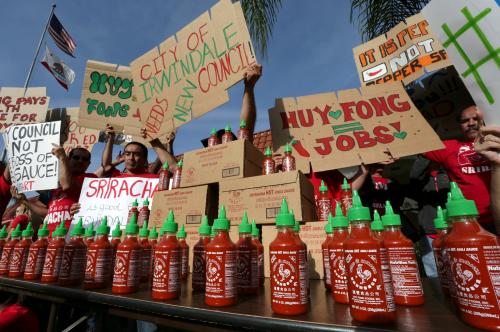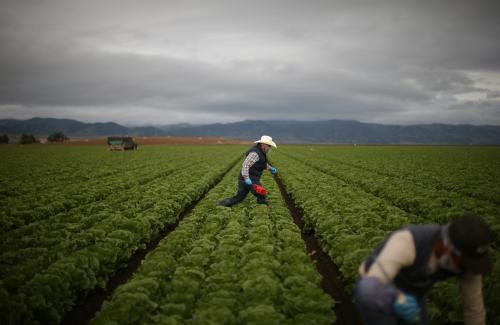Most Americans, at some point, have poured Huy Fong’s Sriracha sauce on their dishes either in a restaurant or at home. Few, however, are aware of the lone entrepreneurial migrant who founded the California factory that produces the popular sauce or the fact that Huy Fong employs hundreds and generates millions of dollars in revenue. Simply put, a key secret to preserving jobs and prosperity in America may be the very migrants who have garnered so much suspicion from President Donald J. Trump.
Founded by David Tran in 1980, Huy Fong Foods today employs close to 200 workers in Irwindale, California and its sales exceed $60 million per year. Tran named the company after the freighter Huey Fong that carried him and over 3,000 other refugees out of Vietnam (at the time, an enemy of the United States) to the coast of California in December 1978.
The story of Huy Fong is not surprising for economists studying the positive link between migration and economic growth. After all, while immigrants represent about 15 percent of the general U.S. workforce, they account for around a quarter of entrepreneurs and a quarter of inventors in the U.S. Moreover, over a third of new firms have at least one immigrant entrepreneur in its initial leadership team. The amount of jobs created by these firms are significant. Firms founded exclusively by immigrants have an initial size of just below five employees, whereas firms with a mixed founder team (immigrants and non-immigrants) have an average initial size of 17 workers. Young companies have created about 1.5 million jobs per year over the past three decades.
What about those migrants that are not entrepreneurs? Are they competing with Americans and lowering their wages? The impact of immigration on the wages of native-born workers overall is very small. If anything, negative impacts occur for the most part on wages of prior immigrants with similar set of skills. Often wages of native-born workers benefit from the presence of immigrants, to the extent that their skills are complementary to each other.
Diverse countries tend to have more innovation and higher productivity growth. All these outcomes are crucial to job creation.
Indeed, migrants from different places and walks of life bring different skills to this country. Such diversity is what makes countries grow faster, and this link is particularly stronger in richer countries, such as the U.S. Diverse countries tend to have more innovation and higher productivity growth. All these outcomes are crucial to job creation. Furthermore, migrants play a role in transferring knowledge across borders that result in more diversified economies in the countries that receive them. In particular, the ability of a country to become a competitive exporter of a given product is higher with immigrants from other nations that export the same product. Furthermore, migrants’ knowhow is a crucial input in creating stronger bilateral networks between countries, which in turn create more opportunities for job growth and investment. Since 2009, the number of jobs supported by export firms grew by 1.7 million, totaling about 11 million by 2015. Clearly, the link between migrants, exports, and jobs is a strong one.
Taxpayers have little to worry about in terms of the costs associated to migration. While the average fiscal burden of each immigrant is about $1,600, second and third generation migrants create a net positive fiscal contribution of $1,700 and $1,300, respectively. And keep in mind that migrants and their families eat, wear clothes, consume housing, and all sorts of other goods and services, increasing aggregate demand and employment growth.
If the Trump administration goes ahead and restricts conditions on work-related visas, then the inflow of skilled workers to the economy would slow down. Closing the doors to these migrants, whether they are refugees or not, is closing jobs opportunities for millions of Americans. Overwhelming evidence shows that migrants are an important ingredient in the recipe of economic growth, while little to no evidence supports the claim that they are, instead, a threat to America’s national security. By cutting on immigration, the country will miss an opportunity for new inventions and ventures that could generate the jobs that the president is so committed to bring back. Thus, if the current administration wants to create jobs and “make America great again,” it should consider enlisting more migrants like Mr. Tran.
The Brookings Institution is committed to quality, independence, and impact.
We are supported by a diverse array of funders. In line with our values and policies, each Brookings publication represents the sole views of its author(s).







Commentary
A spicy red sauce and how immigrants generate jobs and growth in the US
February 7, 2017